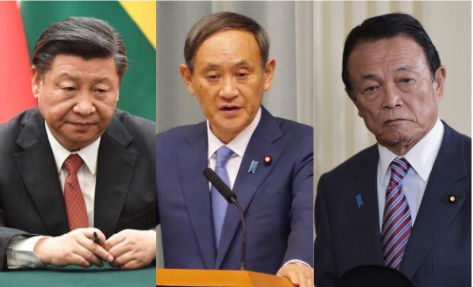When Japanese Prime Minister Shinzo Abe announced his resignation citing bad health, countries like India and Australia also shared Japan’s anguish. Abe has helped Japan emerge as the arch-nemesis of China and there was an apprehension if his resignation would change things. But now, it is becoming clearer that China’s bad days in Japan won’t end anytime soon, notwithstanding Abe’s resignation. Two frontrunners to succeed the ailing Japanese Prime Minister– Deputy Prime Minister Taro Aso and the Chief Cabinet Secretary Yoshihide Suga– both hate China. And as such are poised to continue Abe’s decoupling from China.
Yoshihide, who is said to be leading the race to succeed Abe, is described as the right-hand man of Shinzo Abe. According to The Hindu, Yoshihide is widely expected to embark on the same policy path as the outgoing Japanese Prime Minister Shinzo Abe, including on ‘Abenomics’.
If Yoshihide embarks on the same policy course as set out by Abe, it would essentially mean that he will deepen Japan’s economic and military ties with its Indo-Pacific partners- India, Australia and the United States. Broadly, China would keep on getting marginalised in the great power competition.
Yoshihide has no love lost for China. Within the Abe government, he was the one criticising China over the imposition of the National Security Law in Hong Kong.
When China was brutally robbing Hong Kong of its cherished liberties and freedoms earlier this year, Suga had said, “We are seriously concerned about the decision on Hong Kong by the National People’s Congress despite strong concerns expressed by the international community and the people of Hong Kong, as well as about the current situation in Hong Kong.”
Serving as the Chief Cabinet Secretary in Abe government, Suga had added, “We will continue to closely follow developments and address the situation in collaboration with other countries concerned,” while maintaining that Hong Kong should prosper in a “stable and democratic” manner.
Earlier this month, Suga reiterated the same position on Hong Kong, following arrests of pro-democracy activists by Chinese authorities.
Yoshihide Suga is also an advocate of strongly decoupling from China. In an interview in April to Asia Nikkei, he had strongly proposed reducing Japan’s reliance on China.
He had said, “In the case of surgical masks, for instance, 70% to 80% of what we have here are made in China. Even with factories in Japan running at full throttle, we still had a mask shortage. When China’s economy shut down, a Japanese automaker was unable to procure parts and had to let a plant sit idle. We need to end a heavy reliance on a single country for a particular product or material.”
Suga had added, “For things that are essential to our everyday life, we need to bring production back to Japan or diversify the location of such manufacturing over several countries.”
The Japanese Chief Cabinet Secretary, an Abe loyalist who is also being described as Japan’s ‘Mr. Fixit’ believes in all policies aimed at isolating China which includes the plan to shift Japanese companies away from China and reshape global supply chains. Suga will continue to move Japanese companies out of China to countries like Vietnam, other ASEAN members and perhaps India also, if he becomes the next Prime Minister of Japan.
If China thinks that Yoshihide Suga is the only China-hater in the reckoning, then it is in some more shocks. The other leading contender for the top post in Japan- Taro Aso, Deputy Prime Minister and Finance Minister of Japan is as big a China hater as Suga.
A 79-year old political heavyweight, Taro Aso, has been leading Japan’s backlash against China from the front. For example, in April while addressing lawmakers at the House of Representatives in Tokyo, he had said that the World Health Organisation might have to change its name to “Chinese Health Organisation”.
As the Finance Minister of Japan, Aso is also playing a pivotal role in decoupling from China and reducing economic dependence on the Communist nation. It was under his watch that Tokyo earmarked $2.2 billion to shift Japanese manufacturing companies out of China
More importantly, Aso has been a long-time proponent of forming a strategic, two-front alliance with India to cut China to size. He had once said, “India shares a land border with China, and Japan has had maritime contacts [with China], but for the past 1,500 years and more there has never been a history when our relations with China went extremely smoothly.”
Also, during his one-year term as the Prime Minister of Japan between 2008 and 2009, Aso had taken a major step with the Japan-India Declaration on Security Cooperation that was signed in Tokyo on 22 October 2008. The Declaration had caused anguish in China and was reported by the Chinese State-owned media with the caption– “Japan and India forge a military alliance, to attack China both from front and rear.”
Aso hates China and loves India, and if he comes to power, Beijing’s biggest strategic nightmares will come true, as India and Japan will surround it from both sides.
Therefore, in any case, Japan will see a new Prime Minister who would be as much a China-hater as Shinzo Abe. Abe might have resigned as the Japanese Prime Minister, but his legacy will continue to hurt China for many years to come.

